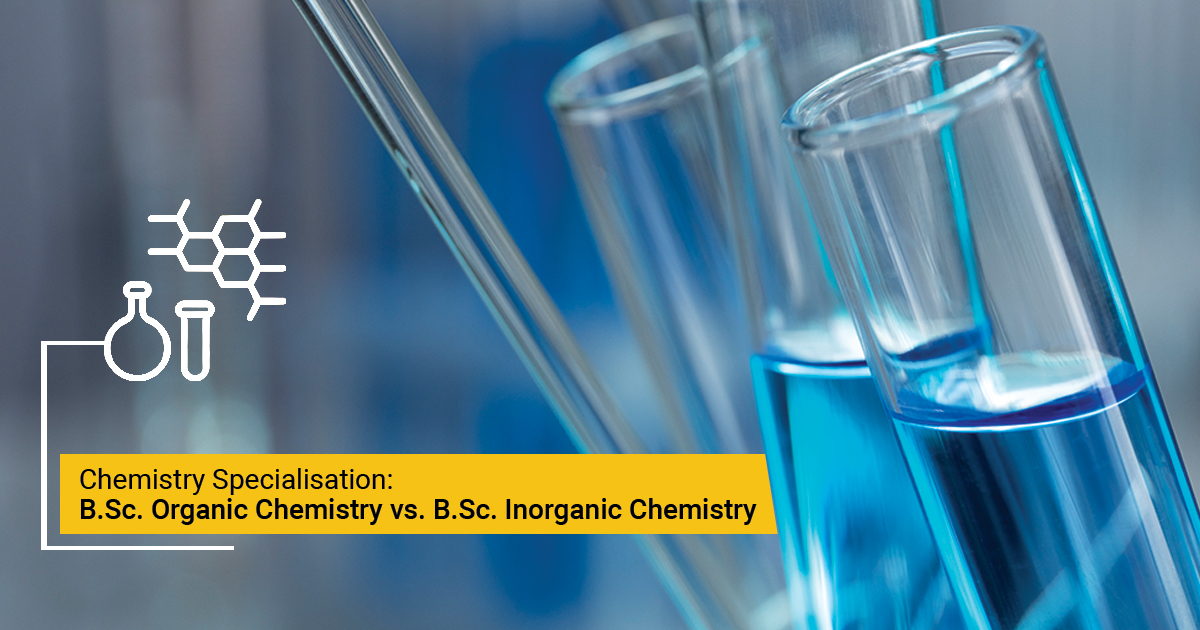Blog Detail


Chemistry Specialisation: B.Sc. Organic Chemistry vs. B.Sc. Inorganic Chemistry
21-11-2024

Pursuing a bachelor's in Organics chemistry opens up the door to career opportunities like working in pharmaceuticals, agrochemicals, petrochemicals, polymers, materials science, and organic synthesis.
A Bachelor in Science Programme in Organic Chemistry dwells in the study of structure, properties, composition, reactive power, features of carbon compositing elements, and their stability. Additionally, organic chemistry also leaps to in-depth research and findings on various other organic compounds, polymers, esters, and more. The subject is found interesting by people who have an inquisitive nature to explore atomic reactions and reagents and their formulations. Organic Chemistry scholars also get the option to work as research scientists, medicinal chemists, academicians, and more.
A Bachelor of Science Programme in Inorganic Chemistry primarily focuses on the study of inorganic compounds (compounds without carbon-hydrogen bonds). The subject majorly deals with compound production, the study of properties, the behaviour of respective elements in different climatic conditions, and more.
B.Sc Organic Chemistry Vs B.Sc Inorganic Chemistry: Course Duration and Eligibility
B.Sc Chemistry curriculum has been designed for 3 years (6 semesters). These three years are inclusive of their internship tenure and major project along with theoretical and practical subject coaching and assessments.
Courses available for all the enthusiasts at both Bachelor’s and Master’s levels are as follows:
- B.Sc Chemistry, Microbiology, Biotechnology [Triple Major]
- M.Sc Chemistry
The minimum eligibility criteria for getting enrolled for B.Sc Chemistry is passing Grade 12 or equivalent studies as accepted by the University with a percentage falling under the cut-offs.
The minimum eligibility criteria for enrolling for M.Sc Chemistry is to hold a Degree in Chemistry from a University that is recognised and accepted under UGC with a percentage falling under the cut-offs.
B.Sc Organic Chemistry Vs B.Sc Inorganic Chemistry: Course Curriculum
Here is the detailed curriculum of B.Sc Chemistry for your further understanding of the Course:
I Semester
● Solutions and Binary liquid mixtures
● Colligative properties
● Quantum mechanics and atomic structure
● Periodic table
● Phase rule
● Classification and Nomenclature of organic compounds
● Basics of organic reactions
● Aliphatic and Alicyclic compounds.
II Semester
● Thermodynamics
● Chemical equilibrium
● Chemical bonding
● Structure and Bonding in nonmetallic compounds
● Aromatic Hydrocarbons
● Halogen derivatives of organic compounds
● Organometallic compounds
III Semester
● Gaseous state
● Liquid state
● Chemical Kinetics
● Silicates and their applications
● Alcohols and ethers, phenols
● Carboxylic acid and Derivatives
● Organic and Inorganic polymers
● Transition and Inner transition elements
IV Semester
● Nuclear and Radiochemistry
● Environmental and Green Chemistry
● Solid state
● surface Chemistry
● Nanoscience
● Metallurgy
● Carbonyl compounds
● Amines, active methylene compounds
V Semester
● Stereochemistry
● Heterocyclic compounds
● Natural products
● Organic spectroscopy
● Industrial and Pharmaceutical Chemistry
● Electrochemistry
● Ionic equilibrium
● Physical spectroscopy
● Photochemistry
● Physical properties and chemical constitution
VI Semester
● Coordination chemistry and metallic
● Coordination compounds in Biological
● Industrial materials
● Analytical Chemistry
● Introduction to Biochemistry
● Carbohydrates, Lipids, amino acids and proteins
B.Sc Organic Chemistry Vs B.Sc Inorganic Chemistry: Career Opportunities
Professional scopes after pursuing Organic and Inorganic Chemistry are working in the fields of material science, environmental science, geochemistry, and chemical manufacturing. Further, the degree also paves the way for the students to work as inorganic chemists, analytical chemists, materials scientists, and research scholars with active contributions to the world’s betterment.
● Chemist: Involves with studying the composition and structure of matter and its underlying influence in the proper functioning of the products across various industries.
● Lab Assistants: They are responsible for performing tests, preparing samples, overseeing the functioning of the lab, and taking care of the reagents with precision.
● Analytical chemist: Works at both government and private chemical research industries carrying out experiments for research and developing new components as per the field requirements.
● Lecturers: Involves with teaching, researching, and guiding students on their projects and dissertations.
● Toxicologist: Works in the labs and deals with chemicals and other reagents testing their toxicity and level of safety and harm in usage index.
● Biochemist: Engages in conducting research, manages laboratories, and prepares technical reports on the new findings and experiments carried out.
● Pharma Assistant: Helps pharmacists in formulating and preparing medicines.
In Short
Chemistry is a prominent branch of science that primarily focuses on the structure, composition, properties, and reactions of matter. This part of science plays a pivotal role in industries and scientific research. Both branches of chemistry are vast in nature and offer a wide variety of career opportunities.
Organic and Inorganic Chemistry are prominent branches of Chemistry as an academic subject with diverse areas of research, findings, and studies. These two types of chemistry branches are suited for students who are highly inquisitive and natural and would like to experiment with all possible reactions and elemental study. Further, by pursuing both courses, ample amount of career opportunities are available with a golden chance to significantly contribute to the world’s betterment and progression for advancing in the scientific field.